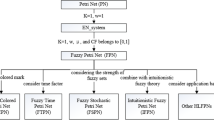Abstract
The simulation of knowledge-based systems (KBSs) has become a significant challenge owing to the rapid increase in the scale of accumulated data. The extended formalisms that are widely used to test, model, and analyze such systems include the fuzzy production rule (FPR) and fuzzy Petri net (FPN). However, with the growth in magnitude of KBSs, it has become difficult to manually generate an FPN. Hence, the authors propose an equivalent transformation algorithm that automatically models an FPN for a sizeable KBS. The proposed method produces a final FPR by initially investigating the inner-inference path(s) between FPRs, followed by a four-phase transformation algorithm that automatically generates an equivalent FPN model for the corresponding KBS rooted in the inner-inference path(s) obtained. A KBS with 13 FPRs is used to demonstrate both the validity and feasibly of the proposed transformation algorithm. The results validate the capability of the generated FPN to fully represent the complete information base contained in the corresponding KBS.













Similar content being viewed by others
References
Awan, M. S. K., & Awais, M. M. (2011). Predicting weather events using fuzzy rule based system. Applied Soft Computing, 11(1), 56–63.
Balazinski, M., Czogala, E., Jemielniak, K., & Leski, J. (2002). Tool condition monitoring using artificial intelligence methods. Engineering Applications of Artificial Intelligence, 15(1), 73–80.
Chen, S. M., Ke, J. S., & Chang, J. F. (1990). Knowledge representation using fuzzy Petri nets. IEEE Transactions on Knowledge and Data Engineering, 2(3), 311–319.
Gao, M. M., Zhou, M. C., Huang, X., & Wu, Z. (2003). Fuzzy reasoning Petri nets. IEEE Transactions on Systems, Man, and Cybernetics Part A: Systems and Humans, 33(3), 314–324.
García-Crespo, Á., Ruiz-Mezcua, B., López-Cuadrado, J. L., & González-Carrasco, I. (2011). A review of conventional and knowledge based systems for machining price quotation. Journal of Intelligent Manufacturing, 22(6), 823–841.
Huang, X. G. (2000). A study on fault diagnosis of gas turbine based on thermal parameters. Ph.D. dissertation, Shanghai Jiao Tong University, Shanghai, China.
Iqbal, A. (2014). Application of computational intelligence and knowledge-based system in predicting flow stress of AISI 4340. Arabian Journal for Science & Engineering, 39(11), 8253–8263.
Law, R., Harvey, A., & Reay, D. (2016). A knowledge-based system for low-grade waste heat recovery in the process industries. Applied Thermal Engineering, 94, 590–599.
Liu, H. C., Liu, L., Lin, Q. L., & Lin, N. (2013). Knowledge acquisition and representation using fuzzy evidential reasoning and dynamic adaptive fuzzy Petri nets. IEEE Transactions on Cybernetics, 43(3), 1059–1072.
Maciol, A. (2017). Knowledge-based methods for cost estimation of metal casts. The International Journal of Advanced Manufacturing Technology, 91(1–4), 641–656.
Nasiri, S., Zenkert, J., & Fathi, M. (2017). Improving CBR adaptation for recommendation of associated references in a knowledge-based learning assistant system. Neurocomputing, 250, 5–17.
Novák, V., & Lehmke, S. (2006). Logical structure of fuzzy IF–THEN rules. Fuzzy Sets and Systems, 157(15), 2003–2029.
Paredes-Frigolett, H., & Gomes, L. F. A. M. (2016). A novel method for rule extraction in a knowledge-based innovation tutoring system. Knowledge-Based Systems, 92, 183–199.
Peng, H., Wang, J., PéRez-JiméNez, M. J., Wang, H., Shao, J., & Wang, T. (2013). Fuzzy reasoning spiking neural P system for fault diagnosis. Information Sciences, 235, 106–116.
Shen, V. R. L. (2006). Knowledge representation using high-level fuzzy Petri nets. IEEE Transactions on Systems, Man, and Cybernetics Part A: Systems and Humans, 36(6), 1220–1227.
Ting, Y., Lu, W. B., Chen, C. H., & Wang, G. K. (2008). A fuzzy reasoning design for fault detection and diagnosis of a computer-controlled system. Engineering Applications of Artificial Intelligence, 21(2), 157–170.
Wai, R. J., & Liu, C. M. (2009). Design of dynamic petri recurrent fuzzy neural network and its application to path-tracking control of non-holonomic mobile robot. IEEE Transactions on Industrial Electronics, 56(7), 2667–2683.
Zhou, K. Q., Zain, A. M., & Mo, L. P. (2015a). A decomposition algorithm of fuzzy Petri net using an index function and incidence matrix. Expert Systems with Applications, 42(8), 3980–3990.
Zhou, K. Q., Zain, A. M., & Mo, L. P. (2015b). Dynamic properties of fuzzy Petri net model and related analysis. Journal of Central South University, 12(22), 4717–4723.
Acknowledgements
This paper was supported through the National Natural Science Foundation of China (NCFC) (No. 61462029), the Research Foundation of the Education Bureau of Hunan Province, China (Nos. 16C1314 and 16B212), and the Research University Grant (RUG) UTM (No. Q. J13000. 2528. 11H72).
Author information
Authors and Affiliations
Corresponding author
Rights and permissions
About this article
Cite this article
Zhou, KQ., Mo, LP., Jin, J. et al. An equivalent generating algorithm to model fuzzy Petri net for knowledge-based system. J Intell Manuf 30, 1831–1842 (2019). https://doi.org/10.1007/s10845-017-1355-x
Received:
Accepted:
Published:
Issue Date:
DOI: https://doi.org/10.1007/s10845-017-1355-x




